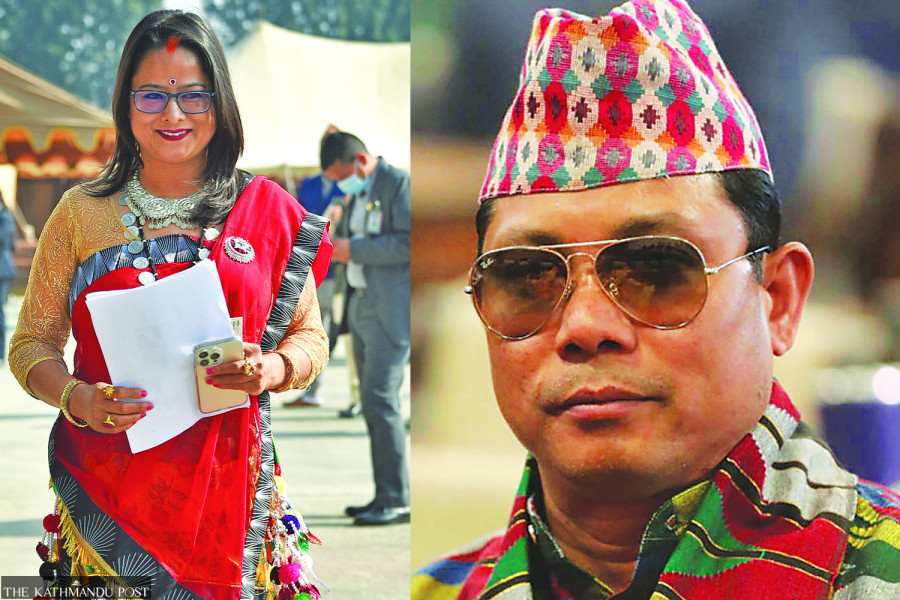Politics
After JSP-Nepal, Nagarik Unmukti geared to quit Congress-UML coalition
Unmukti party chief Ranjita Shrestha has directed the Parliamentary Party to withdraw support to Oli government.
Post Report
Angered by the Sudurpaschim chief minister’s move to remove its minister, the Nagarik Unmukti Party has decided to stay in the opposition in both provincial and federal legislatures.
While its provincial parliamentary party on Friday decided to withdraw its support to the Nepali Congress-led Sudurpaschim provincial government, party chairperson Ranjita Shrestha has sought a similar decision at the federal level.
Ganga Ram Chaudhary, parliamentary party leader of the lower house, said the party chair has asked him in writing to call a meeting and decide to this effect.
“I will call the parliamentary party meeting in a couple of days after returning to Kathmandu from Kailali,” he said. “It will take a formal decision.”
Party’s lawmaker Arun Kumar Chaudhary is a state minister in the incumbent KP Sharma Oli government.
The party with four seats in the House of Representatives is furious with the CPN-UML-Nepali Congress coalition after its leader Rameshwor Chaudhary, provincial minister for industry, tourism and forest, was sacked by chief minister Kamal Bahadur Shah of the Congress.
The Nagarik Unmukti is the second party that is preparing to break the partnership with the ruling alliance.
The Janata Samajbadi Party’s central committee meeting held on June 21 and 22 also decided to withdraw its support to the Oli government concluding that it has failed to deliver on key issues such as controlling corruption, ensuring good governance and improving the economy.
It has also accused the incumbent government of failing to meet expectations on constitutional amendments, economic recovery and governance.
JSP-Nepal, which has five members in the House of Representatives and three in the National Assembly, extended support to the Oli government without joining the Cabinet.
“Our parliamentary party meeting on Saturday will take a necessary decision to this effect,” said Rekha Yadav, the party’s member at the lower house. “I am sure it will take a decision as directed by the central committee.”
The constitution mandates the prime minister to go for a floor test if any party in the government withdraws its support. Article 100 (2) of the Constitution of Nepal says “the prime minister shall table a motion for the vote of confidence in the House of Representatives if the party which the prime minister represents is divided or the party in the government withdraws its support.”
However, some constitutional experts say the vote of confidence is necessary when the government risks falling into minority, which is the spirit of the constitution. “Generally, the prime minister goes for a floor test if the exit of any coalition partner might take into the minority,” said Mohan Lal Acharya, a constitutional lawyer.
The UML-Congress held a comfortable majority even after the exit of the Nagarik Unmukti and the JSP-Nepal. Support of 138 lawmakers is required to secure a majority in the 275-member House of Representatives.
The past practices are not the same.
In December 2019, the Samajbadi Party led by Upendra Yadav withdrew support to the Oli-led government of the Nepal Communist Party. The prime minister did not opt for the floor test saying he held a comfortable majority.
However, Pushpa Kamal Dahal faced the House after the Yadav-led party quit his government in May last year despite still enjoying a comfortable majority.
Even as the exit of two regional parties doesn’t affect the government, it might face problems in the legislative process. The present coalition, which commands a strong majority in the House of Representatives, doesn’t have a majority in the National Assembly.
This means getting the bills endorsed from the upper house without the JSP-Nepal’s support would be impossible.




 10.12°C Kathmandu
10.12°C Kathmandu














